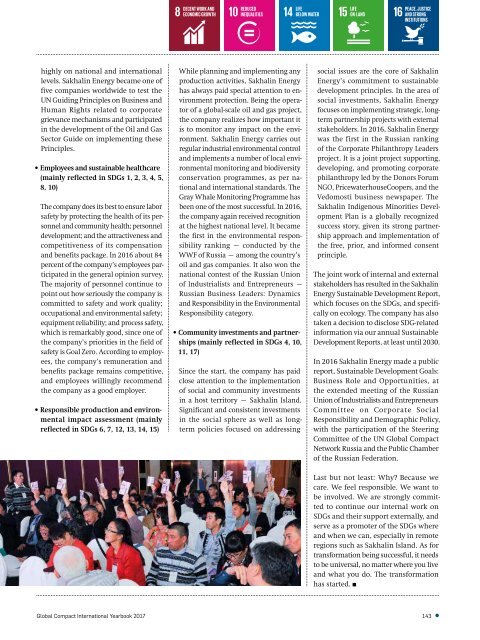Global Compact International Yearbook 2017
Sustainability in Troubled Times We life in times of uncertainty and global (dis)Order. „Understanding global mega-trends is crucial. We live in times of multiple, evolving and mutually-reinforcing shifts“, says UN Secretary-General António Guterres. He adds: „These dynamics, of geopolitical, demographic, climatic, technological, social and economic nature, enhance threats and opportunities on an unprecedented scale.“ Therefore sustainability in troubled times is the key topic of the Global Compact International Yearbook 2017, edited by macondo publishing.
Sustainability in Troubled Times
We life in times of uncertainty and global (dis)Order. „Understanding global mega-trends is crucial. We live in times of multiple, evolving and mutually-reinforcing shifts“, says UN Secretary-General António Guterres. He adds: „These dynamics, of geopolitical, demographic, climatic, technological, social and economic nature, enhance threats and opportunities on an unprecedented scale.“ Therefore
sustainability in troubled times is the key topic of the Global Compact International Yearbook 2017, edited by macondo publishing.
Create successful ePaper yourself
Turn your PDF publications into a flip-book with our unique Google optimized e-Paper software.
highly on national and international<br />
levels. Sakhalin Energy became one of<br />
five companies worldwide to test the<br />
UN Guiding Principles on Business and<br />
Human Rights related to corporate<br />
grievance mechanisms and participated<br />
in the development of the Oil and Gas<br />
Sector Guide on implementing these<br />
Principles.<br />
• Employees and sustainable healthcare<br />
(mainly reflected in SDGs 1, 2, 3, 4, 5,<br />
8, 10)<br />
The company does its best to ensure labor<br />
safety by protecting the health of its personnel<br />
and community health; personnel<br />
development; and the attractiveness and<br />
competitiveness of its compensation<br />
and benefits package. In 2016 about 84<br />
percent of the company’s employees participated<br />
in the general opinion survey.<br />
The majority of personnel continue to<br />
point out how seriously the company is<br />
committed to safety and work quality;<br />
occupational and environmental safety;<br />
equipment reliability; and process safety,<br />
which is remarkably good, since one of<br />
the company’s priorities in the field of<br />
safety is Goal Zero. According to employees,<br />
the company’s remuneration and<br />
benefits package remains competitive,<br />
and employees willingly recommend<br />
the company as a good employer.<br />
• Responsible production and environmental<br />
impact assessment (mainly<br />
reflected in SDGs 6, 7, 12, 13, 14, 15)<br />
While planning and implementing any<br />
production activities, Sakhalin Energy<br />
has always paid special attention to environment<br />
protection. Being the operator<br />
of a global-scale oil and gas project,<br />
the company realizes how important it<br />
is to monitor any impact on the environment.<br />
Sakhalin Energy carries out<br />
regular industrial environmental control<br />
and implements a number of local environmental<br />
monitoring and biodiversity<br />
conservation programmes, as per national<br />
and international standards. The<br />
Gray Whale Monitoring Programme has<br />
been one of the most successful. In 2016,<br />
the company again received recognition<br />
at the highest national level. It became<br />
the first in the environmental responsibility<br />
ranking – conducted by the<br />
WWF of Russia – among the country’s<br />
oil and gas companies. It also won the<br />
national contest of the Russian Union<br />
of Industrialists and Entrepreneurs –<br />
Russian Business Leaders: Dynamics<br />
and Responsibility in the Environmental<br />
Responsibility category.<br />
• Community investments and partnerships<br />
(mainly reflected in SDGs 4, 10,<br />
11, 17)<br />
Since the start, the company has paid<br />
close attention to the implementation<br />
of social and community investments<br />
in a host territory – Sakhalin Island.<br />
Significant and consistent investments<br />
in the social sphere as well as longterm<br />
policies focused on addressing<br />
social issues are the core of Sakhalin<br />
Energy’s commitment to sustainable<br />
development principles. In the area of<br />
social investments, Sakhalin Energy<br />
focuses on implementing strategic, longterm<br />
partnership projects with external<br />
stakeholders. In 2016, Sakhalin Energy<br />
was the first in the Russian ranking<br />
of the Corporate Philanthropy Leaders<br />
project. It is a joint project supporting,<br />
developing, and promoting corporate<br />
philanthropy led by the Donors Forum<br />
NGO, PricewaterhouseCoopers, and the<br />
Vedomosti business newspaper. The<br />
Sakhalin Indigenous Minorities Development<br />
Plan is a globally recognized<br />
success story, given its strong partnership<br />
approach and implementation of<br />
the free, prior, and informed consent<br />
principle.<br />
The joint work of internal and external<br />
stakeholders has resulted in the Sakhalin<br />
Energy Sustainable Development Report,<br />
which focuses on the SDGs, and specifically<br />
on ecology. The company has also<br />
taken a decision to disclose SDG-related<br />
information via our annual Sustainable<br />
Development Reports, at least until 2030.<br />
In 2016 Sakhalin Energy made a public<br />
report, Sustainable Development Goals:<br />
Business Role and Opportunities, at<br />
the extended meeting of the Russian<br />
Union of Industrialists and Entrepreneurs<br />
Committee on Corporate Social<br />
Responsibility and Demographic Policy,<br />
with the participation of the Steering<br />
Committee of the UN <strong>Global</strong> <strong>Compact</strong><br />
Network Russia and the Public Chamber<br />
of the Russian Federation.<br />
Last but not least: Why? Because we<br />
care. We feel responsible. We want to<br />
be involved. We are strongly committed<br />
to continue our internal work on<br />
SDGs and their support externally, and<br />
serve as a promoter of the SDGs where<br />
and when we can, especially in remote<br />
regions such as Sakhalin Island. As for<br />
transformation being successful, it needs<br />
to be universal, no matter where you live<br />
and what you do. The transformation<br />
has started.<br />
<strong>Global</strong> <strong>Compact</strong> <strong>International</strong> <strong>Yearbook</strong> <strong>2017</strong> 143

















